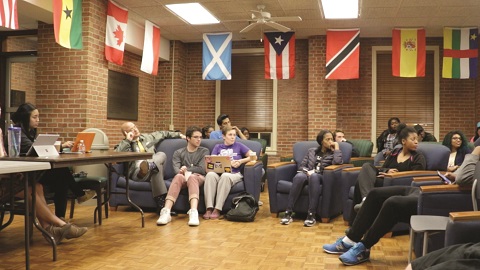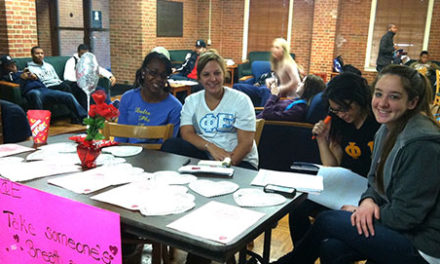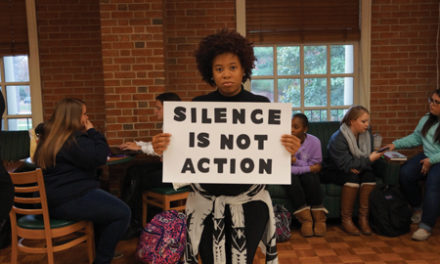By Brittany Wilson and Kristen Griffith, The Whetstone
Natalie Trujillo stood in the College Center, handing out merchandise to anyone willing to take something. Dozens of students walked away with Whetstone pens, t-shirts, coffee mugs and beer koozies—but nothing seemed to excite them as much as the semester’s first November edition of the paper.
“It was nice to know the majority of students were supportive of the one outlet where students are able to share their opinions,†Trujillo said. “Students look forward to new issues since the Whetstone has the ability to expose information at Wesley that is crucial to students’ experience.â€
The issue included articles about homecoming, the rugby coach’s resignation, and Wesley College’s violation of Title IX.
But in the days that followed the distribution of The Whetstone, senior Kevin Johnson said all students seemed to talk about was the article featured on the issue’s front page titled “Title IX: Students Concerned President’s History Will Repeat Itself.â€
The article detailed the struggle of United States Naval Academy former-midshipman, Annie Kendzior, who expressed her concerns about Wesley College President Robert Clark’s past in handling cases of sexual assault.
Although Kendzior says she was raped on two separate occasions as a freshman in 2008, she did not report the incidents until 2011—the same year Clark became commandant at the Naval Academy. A few months later, Clark chaired the hearing that sent Kendzior home before she could graduate.
(to see the full article, visit https://whetstone.victorgreto.art/2016/11/04/title-ix-students-concerned-presidents-history-will-repeat-itself-2/)
Johnson said he wasn’t surprised when he read the article.
“With all the events that have been transpiring since President Clark came into office, I wasn’t surprised he said some of the things said in the article,†he said. “All in all, I thought the article was solid.â€
Kendzior said she initially reached out to The Whetstone because she did not want a story like hers to repeat on Wesley College’s campus.
“I hope to continue to bring awareness to this issue that is far too common in our society and to help prevent it from happening to another person,†she said. “Speaking out gives those who are hiding in fear or shame a voice that deserves to be heard.â€
Dr. Kathleen Curran however, said students shouldn’t be concerned with Clark’s history.
“First of all, President Clark is in a different position – he is no longer equivalent to the Dean of Students and thus he would not be involved initially, and perhaps not at all, in any such cases,†she said.
Curran said Kendzior might not have upheld the Naval Academy’s honor system.
“Technically Miss Kendzior would not have been expelled for being the victim of the assault, or reporting a sexual assault, but for violating the honor code,†she said.
November 4, only a few days after the story was published, Clark sent a campus-wide email to Wesley students, faculty and staff to “comment†on the article.
He said he would not release any information about the case for privacy reasons.
“Though I will not talk about detailed specifics concerning Ms. Kendzior’s case… I will say that the comments presented in the Whetstone article in terms of my interactions with Ms. Kendzior and what led up to her dismissal are incomplete, misleading and untrue,†the email said.
Kendzior said she thought the article was a fair and thorough account of what happened to her at the Naval Academy.
“It’s the same story that has been reported by ESPN, CNN, The Guardian and dozens of other media outlets,†she said. “I guess those are all ‘incomplete, misleading, and untrue’ too?â€
Curran said Clark gave the only response he could.
“The only way he could address the accusations directly would be to share confidential information,†she said. “It would have devolved into a ‘he said, she said’ scenario very quickly.â€
Four days after Clark’s email was sent, Wesley’s SGA hosted “Coffee and Concerns,†a town hall meeting in the College Center that offers students the opportunity to express their frustrations and concerns to the student leadership, and brainstorm viable solutions.
SGA invited Clark to address the student’s concerns regarding the article that had been published in The Whetstone.
SGA Secretary Kelsey Fitzpatrick said they had hoped the president would ease students’ concerns with an explanation of the case featured in The Whetstone’s article, but his response did not help.
“I was expecting his answers to have a bit more clarity and to leave a better feeling about the situation after,†she said.
The College Center lobby’s chairs and couches were organized auditorium-style facing the SGA executive board. This seating filled up quickly, and students began dragging chairs in from The Den so they would have a place to sit.
Sophomore Marquita Dickerson-Frisby said she knew there would be a big turnout at Coffee and Concerns.
“When stuff that’s controversial like that pops up, a lot of people tend to flock,†she said.
At 8 o’clock, SGA introduced Clark, who offered a brief explanation of the article.
Clark told the audience that although The Whetstone had requested an opportunity to discuss the events included in the article with him, he declined an interview.
“I told them that I wouldn’t comment for a couple of reasons,†he said. “One, from a relevancy stand point but most importantly from a privacy stand point for that young lady.â€
Clark said the case was in the past— he did not want to re-victimize Kendzior by readdressing the situation.
“I was not going to go through that again, nor will I get into specifics of what actually transpired and why the dismissal happened,†he said.
Dickerson-Frisby said Clark’s response was vague and sometimes off-topic.
“He wasn’t being direct at all,†she said. “There was something not right with the situation because of how he was answering the questions. It was just weird.â€
Dickerson-Frisby said she was already familiar with the way Clark avoids answering questions after attending last semester’s open forum. She said she asked him to explain the dismissal of former Chaplain Scot McClymont, a question for which she said she never got an answer.
After Clark’s explanation, SGA opened the floor to students who had questions for the president.
Junior Mercedes Myrick stood and asked Clark to explain Title IX to those students in attendance who may not understand what it is and how it works.
“Not only that, I need reassurance that (Clark) understands what Title IX is, because if you don’t have a definition yourself, how do you act upon Title IX situations?†she asked.
She also asked Clark what precautions the staff and faculty are taking to avoid potential Title IX violations in the future.
“So even if (faculty and staff) are not around and there’s something I see, I can provide somebody else with those resources,†she said. “That’s what a ‘family’ does.â€
Clark referred Myrick to Wesley’s website for the answers to both questions.
When asked what specifically in the article was “incomplete, misleading and untrue,†Clark mentioned the Department of Education’s Office of Civil Rights’ (OCR) quote, which said Title IX does not apply to the United States’ Naval Academy.
“As indicated in our regulations at 34 C.F.R. Part 106.13, Title IX does not apply to ‘educational institution(s) whose primary purpose is the training of individuals for a military service of the United States,’†the OCR said. “Accordingly, OCR’s regulations do not apply to the Naval Academy in Annapolis.â€
Clark disagreed.
“That was just factually incorrect— (Annie) did have Title IX protection,†he said. “Whether it’s a service academy, whether it’s civilian school, Title IX is a federal law.â€
Kendzior said the information from the OCR was correct—she was not protected by Title IX.
“Years ago I was part of a discussion with the White House Task Force to Protect Students from Sexual Assault regarding Title IX and sexual assaults on college campuses,†she said. “I was asked to speak out about the disadvantages about being raped by an athlete at a military academy because we are not protected under that law.â€
Kendzior said her case was still being investigated when she was dismissed from the Academy.
“I had a call with the NCIS investigating team and my lawyer in mid-October 2013 where they told me that the males who raped me claimed that it was all consensual so there was no evidence for their case to continue,†she said. “I was kicked out July 2011 so it was quite a while before any official NCIS investigation was finalized.â€
Clark mentioned that Kendzior’s father had filed several law suits against the Naval Academy, but nothing ever came of them.
Kendzior said that she was the one who filed the civil suit, and it was dismissed for “failure to state a claim.â€
Later the town hall meeting’s discussion turned from Kendzior’s case to the “credibility†of The Whetstone.
Students gathered in the College Center for Coffee and Concerns where President Clark came to answer their questions
Clark said, “The Whetstone is the voice for the students, not the voice of the students,†a statement that Johnson immediately stood up to argue.
“This is the voice of the students because the things that go into the Whetstone are things that immediately impact us and the environment that we live in at Wesley College,†Johnson said. “It has to be our voice.â€
Clark said most of the stories in The Whetstone were negative and unbalanced, but Johnson said this negativity inspires positive change.
“If the things put in the paper are generally negative then obviously that needs to evoke change in the environment that we live in,†he said. “We can’t just sit here and act like nothing is going on. Just because there’s negativity doesn’t mean we have to balance it out with positivity.â€
Junior Ed Brandenburg said the forum went exactly how he expected— disappointing.
“I assumed Clark was going to walk around the situation and avoid the topic, which he did,†he said. “Also he blatantly showed that he didn’t even read the full article because his information was a misrepresentation of the actual Whetstone article, even though he argued so passionately about it.â€
Clark declined further comment.
“It has no impact on what we do here at Wesley,†he said.






